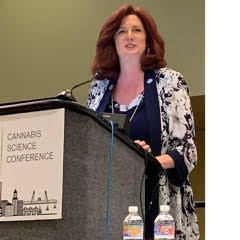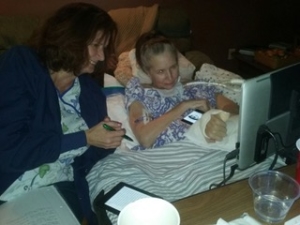A Day in the Life of a Cannabis Nurse
By Dawn-Marie Steenstra, LPN
My day starts at 0700 with a text from a patient’s mother, “She is having issues with abdominal pain again and not sleeping. I can’t take her crying out anymore.”
These issues are common in a patient with a terminal illness. But my patient and her family have decided to use cannabinoid therapeutics during her hospice journey as per the recommendation of her oncologist. Medical cannabis is legal in Maryland. As a cannabis nurse, I am familiar with the products available on the market. The patient has been stabilized using a 1:1 THC/CBD RSO (“Rick Simpson Oil”), a full spectrum cannabis hemp CBD oil (cannabidiol) for pain, and a CBN (cannabinol) dominant tincture for sleep at night. She has ongoing issues with nausea and emesis from a transient abdominal blockage. She refuses to use cannabis via inhalation, so we decide to try topical patches. We discuss using Roxanol, Zofran, and Ativan as needed to get the patient stabilized over the next day or so. We had called her oncologist to have these available in the event of an emergency the week before.
I call her oncologist and give an update. The oncologist is hopeful the combination of therapies will keep the patient stabilized through her transition. We determine which medications will be used “as needed”. I never recommend that a cancer patient disregard the options available through western medicine. Prescriptions give a quick fix when formula readjustment is required. Cancer is a very tricky disease. It challenges any nurse caring for a patient in the final days of life. Our goal is quality over quantity of life so that it can be as pain-free and comfortable as possible. Both approaches to treatment can be used safely with good outcomes.
I head to work at the dispensary at 0800. On the way, I take two calls. One from a family member recently converted to cannabis regarding administration methods and a nurse practitioner friend to discuss a project to help senior living. I have two days that I come into the dispensary for in-person consults. I am usually able to do four sessions in one day. Each session can take up to two hours depending on the complications of the case. Today, there are multiple patients from the largest retirement community in Maryland. I am now an Advisor to their “Cannabis 101 Club”, with over 160 members and 200 more who come to every single event.
Most of my work revolves around evaluating medications and concurrent comorbid conditions. Once that is done, we begin with the top three symptoms that patients wish to alleviate. Most often I hear that patients want relief from pain, anxiety, and sleep issues (in that order). Unfortunately, there is a huge void from recommending physicians on dosing and which formulations to start with in my state. I frequently consult with healthcare professionals and peers that know the science and the products.
I have patients come in on the bad advice of a budtender more often than not. It isn’t always their fault. Budtenders are not trained and do not know a patient is also taking Coumadin for a post-op hip replacement. Or Hydrochlorothiazide for blood pressure, which can cause side effects the patient does not want. This can lead to decreased effectiveness of a blood thinner or a precipitous drop in blood pressure from too much THC. These important considerations should not be a budtender’s responsibility. It should be addressed by a qualified medical professional working with the dispensary.
A cannabis nurse is uniquely responsible to take everything into account regarding a patient’s care. This incorporates psychological considerations, mental health concerns, pre-existing conditions, medication reconciliation, and most of all, education. We need to educate everyone constantly, including patients, dispensary workers, recommending doctors and hospital workers, and people in other healthcare settings. Because of the medical conditions we use this plant for, there should certainly be a trained cannabis nurse or medical professional available at every dispensary to accommodate these intricate issues with medical patients.
My decision to become a Cannabis Nurse
I became a cannabis nurse because of the dramatic failure I witnessed for over 25 years in long term care environments for the elderly. Reimbursement seems to favor keeping people “just sick enough” to hop between the hospital and skilled nursing facilities. Hospice patients in my care are not being well managed for chronic pain, side effects of their medications, nor the wounds I am charged with addressing.
This contradiction came into sharp focus about a year into my own breast cancer journey 10 years ago. I had a deep understanding of the limitations of conventional treatment and the frustration I experienced in skilled nursing and palliative care. This was compounded by my own personal experience of the immense suffering I witnessed in fellow patients while undergoing my own cancer treatment. Medical cannabis had never been proposed as a consideration to ease any of our side effects.
 Since learning about cannabis at a Patients Out of Time Conference in 2012, my patient advocacy went to the next level. I now work directly with legislative bodies in my state and give testimony as a medical professional. I teach nurses from various organizations in different states about how cannabis came to be prohibited in our formulary of acceptable medicine. I give a “Cannabis 101” class on the endocannabinoid system to introduce the nurse to the body’s master regulation system that is not taught in medical schools. It is exhilarating and terribly frustrating to hear the old tapes of rhetoric playing of how horrible this “drug” is. This wonderful herbal remedy is still being vilified. This is another wall that must be carefully chipped away for those who are trying to understand how we got here.
Since learning about cannabis at a Patients Out of Time Conference in 2012, my patient advocacy went to the next level. I now work directly with legislative bodies in my state and give testimony as a medical professional. I teach nurses from various organizations in different states about how cannabis came to be prohibited in our formulary of acceptable medicine. I give a “Cannabis 101” class on the endocannabinoid system to introduce the nurse to the body’s master regulation system that is not taught in medical schools. It is exhilarating and terribly frustrating to hear the old tapes of rhetoric playing of how horrible this “drug” is. This wonderful herbal remedy is still being vilified. This is another wall that must be carefully chipped away for those who are trying to understand how we got here.
The majority of my consultation work involves the senior population, those who come to me are sick and tired of being “sick and tired”. Most seniors are disillusioned with the medical field and all the prescriptions that doctors pile on top of another. They are looking to take back control of their health. Many are afraid of the concept of “getting high”. I then need to carefully explain what we are working to accomplish. My clients want to feel better, engage in their beloved activities, care for themselves as independently as possible, be pain-free, and get a good night’s sleep. We have found that most seniors benefit from a trial of a CBD dominant product. Usually, patients develop a way to manage pain or anxiety. This alone is an effective way to show that cannabis has therapeutic potential. Even naïve patients are curious about effectiveness, and if whether or not this forbidden plant could actually help their issues.
Everyone’s endocannabinoid system is unique. Once a recommending physician or a cannabis nurse comes to a starting point, the rest is trial and error. Many times, we need to be able to find alternatives if products are suddenly not available. And many products in the cannabis space are devoid of most naturally occurring terpenes. Most of the time, terpenes (if present) are added after extraction and processing. This flies in the face of using the whole plant to treat the entire person to formulate the best treatment plan for them. Generally, products only provide THC, CBD, CBN concentrations. Terpene values are sometimes available on a lab’s certificate of analysis, but not always.
After my consultations, I make a house call to a private patient that I caregive. She is homebound from disability and depends on me to acquire her medicine and deliver it to her. She lives with her daughter and her family. We discuss her care plan. I answer all sorts of questions so her family knows that cannabis is a legitimate treatment modality and not a hoax. I recommend Sanjay Gupta’s “Weed” series on YouTube for a quick education.
On the way home an hour and a half later, I take another call from an associate asking me to work on a public outreach event at a fair over the weekend. We will be handing out educational trifold brochures and engaging the community in a dialog about our state program. We care deeply for our communities.
I get home at around 1800 and prepare for a group lecture the following week. I carefully update my presentation with the latest science and research. Everyday new information comes to light. We need to keep abreast of every development. Knowledge of cutting edge science is crucial to being a successful nurse.

Being a cannabis nurse means many things. As a nurse, we have the professional and ethical obligation to live up to our reputation. For 18 years in a row, nursing has been ranked the most trusted profession. We care for patients from all walks of life, at all ages, in all circumstances, from every nationality and class. We hurt with them, we rejoice with them, we teach for them. Above all, as cannabis nurses, we are front line advocates for our patients. We fight for the basic human right to use this safe and effective herbal remedy. We have seen the impact that it can have on alleviating human suffering. We have either witnessed the amazing ways it works or have had personal experience with it as medicine. Everyone has their own personal story of how they came to this work at this time in history.
Every patient deserves a trusted advocate in this fight. Together, we will turn the tide towards wellness utilizing this plant, in all her forms and formulations, to bring healing to the world. I would not trade what I do for anything. For the first time in many years, I feel as if I am truly helping people rather than keeping the merry-go-round of modern healthcare spinning.
Cannabis Nursing: A New Specialty of Practice
Over the past 25 years, the medicinal benefits of the cannabis plant have made a dramatic impact on patients from all walks of life and experience. From simple flower form to extracts, edibles, topicals, and patches, more patients are finding relief from a myriad of mental and physical conditions. More States and countries are legalizing cannabis as a wellness option. Anecdotal personal stories are miraculous at times. I have personally seen many symptoms being dramatically reduced or eliminated with cannabis medicine, including muscle spasm, pain syndromes, and seizures. Anecdotal accounts and case studies are being replaced by research worldwide. Clinical studies demonstrate the plant’s efficacy and potential use for a wide range of conditions. Soon, we will have studies in the US that require descheduling cannabis and making it available to those who may benefit from its use.
As the use of cannabis for medical purposes increases, there will be a larger need for nurses familiar with the different constituents of medicinal cannabis and their applications. And they will also be required to navigate the ethical and legal implications with nursing care and cannabis use.
According to the American Cannabis Nurses Association (ACNA), cannabis nursing is defined as nursing care that incorporates knowledge of:
- The endocannabinoid system (the master regulator of homeostasis)
- The safe use of herbal cannabis products
- The awareness of the legal implications associated with the use of herbal cannabis products
Cannabis nurses evaluate the risks and benefits of available cannabis treatments. This includes:
- Guiding patients on the use of cannabis and minimizing side effects
- Identifying potential drug interactions in current treatment
- Recognizing safe, tested, and compliant medicine
- Assisting in titrating or tapering doses
- Teaching quality assurance measures and evaluating certificates of analysis
- Educating other medical professionals and patients
Cannabis nurses understand that cannabis is a treatment that involves a continuum of care. Working with patients’ recommending physicians and following treatment protocols are critical to the efficacy of care.
How to Become a Cannabis Nurse
According to the ACNA, any licensed or registered nurse can become a cannabis nurse. The ACNA developed two courses to educate nurses on the basics of cannabis and its use in modern medicine. The course is offered through The Medical Cannabis Institute (TMCI Global). There are also courses for competency through Radical Health and also Dustin Sulak, DO of Healer, a well-recognized doctor in the space.
Attending clinically-based conferences to learn the latest information is crucial to develop a well-rounded education. Groups like Patients Out Of Time, Cannabis Nurses Network, Cannabis Science, and Cannabis for Medical Professionals are essential to our knowledge base. This provides realtime experience from other medical and science professionals working directly in the field.
Those who have completed the ACNA’s cannabis courses are considered competent in cannabis nursing. The ACNA is currently working to petition the American Nurses Credentialing Center to recognize cannabis nursing as a sub-specialty and grant national certification. In the meantime, nurses are largely on their own to find credible sources of accurate information. This is why nurses with knowledge of the plant should be teaching their peers where to access accurate information and education.
For more information, visit the Scope and Standards of Practice for Cannabis Nurses through the American Cannabis Nurses Association.
As we can clearly see, cannabis for health management is already happening widely around the world. It is time to release its restrictive status as a therapy without medical value in the Controlled Substance Act and the Single Convention Treaty. Cannabis is already a gamechanger in healthcare worldwide. It’s high time it was accepted as such.
Dawn-Marie Steenstra, LPN is an SCC member and who also sits on the Editorial Committee. For 20 years she operated an assisted living facility caring for elderly, primarily psychiatric patients. She worked with Maryland state regulators during the crafting of the state’s assisted living regulations and was the only Licensed Practical Nurse (LPN) in the State of Maryland to oversee her own facility as a Designating Nurse. In her nursing career, she has held positions in management, staff development, infection control, and quality assurance. Dawn is a former board member of the American Cannabis Nurses Association. She frequently is asked to submit state & federal testimony for policy adjustments related to the therapeutic potential of cannabis.
Further Reading
- Cannabis Nurses Share Info from the Front Lines
- Cannabis Nurses Answer Common Patient Inquiries
- Calling the Cannabis Nurses Hotline
- Patient Education is a Phone Call Away: An Inside Look at a Cannabis Nurses Hotline
- Cannabis use in palliative care – an examination of the evidence and the implications for nurses
References
- Pettinato, Maria PhD, RN, CCN. “Medicinal cannabis: A primer for nurses”. Nursing, 2019.
- American Nurses Association. (2016). Therapeutic Use of Marijuana and Related Cannabinoids | ANA Position Statements
- American Nurses Association. (2015a). Scope and Standards of Practice (3rd edition). Silver Springs, MD.
- American Nurses Association. (2015b). Code of Ethics for Nurses with Interpretive Statements. Silver Springs, MD.


